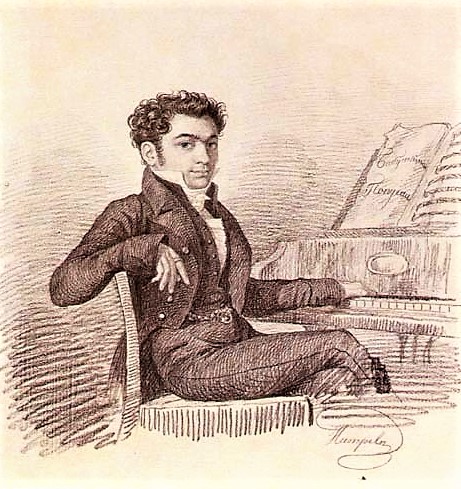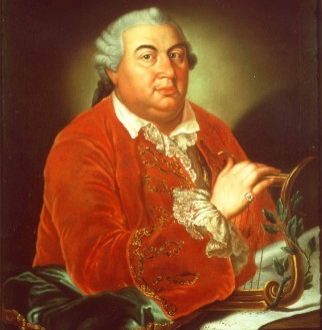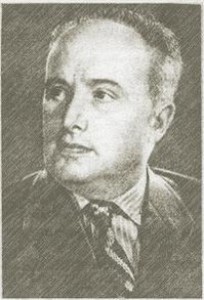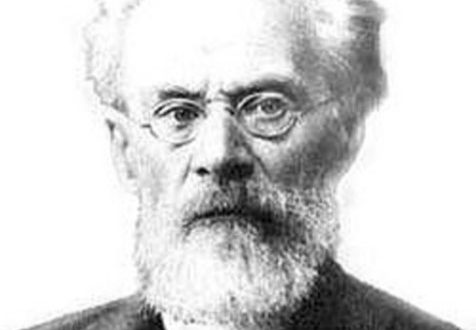
Alexey Nikolaevich Verstovsky |
Alexey Verstovsky
A talented Russian musician, composer and theater figure A. Verstovsky was the same age as Pushkin and an older contemporary of Glinka. In 1862, after the composer’s death, the outstanding music critic A. Serov wrote that “in terms of popularity, Verstovsky overpowers Glinka,” referring to the unusually persistent success of his best opera, Askold’s Grave.
Having entered the musical field in the late 1810s, Verstovsky was at the center of the musical and theatrical life of Russia for more than 40 years, actively participating in it both as a prolific composer and as an influential theater administrator. The composer was closely acquainted with many outstanding figures of Russian artistic culture. He was “on you” with Pushkin, Griboyedov, Odoevsky. Close friendship and joint work connected him with many writers and playwrights – primarily A. Pisarev, M. Zagoskin, S. Aksakov.
The literary and theatrical environment had a noticeable influence on the formation of the composer’s aesthetic tastes. Proximity to the figures of Russian romanticism and Slavophiles was reflected both in Verstovsky’s commitment to Russian antiquity, and in his attraction to “devilish” fantasy, to fiction, bizarrely combined with a loving reproduction of the characteristic signs of national life, real historical persons and events.
Verstovsky was born on the Seliverstovo estate in the Tambov province. The composer’s father was the illegitimate son of General A. Seliverstov and a captive Turkish woman, and therefore his last name – Verstovsky – was formed from part of the family name, and he himself was assigned to the nobility as a native of the “Polish gentry.” The musical development of the boy took place in a favorable environment. The family played a lot of music, my father had his own serf orchestra and a large music library for those times. From the age of 8, the future composer began to perform in amateur concerts as a pianist, and soon his penchant for musical writing also manifested itself.
In 1816, by the will of his parents, the young man was assigned to the Institute of the Corps of Railway Engineers in St. Petersburg. However, after studying there for only one year, he left the institute and entered the civil service. The gifted young man was captured by the musical atmosphere of the capital, and he continues his musical education under the guidance of the most famous Petersburg teachers. Verstovsky took piano lessons from D. Steibelt and J. Field, played the violin, studied music theory and the basics of composition. Here, in St. Petersburg, a passion for the theater is born and grows stronger, and he will remain a passionate supporter of it for the rest of his life. With his characteristic ardor and temperament, Verstovsky takes part in amateur performances as an actor, translates French vaudevilles into Russian, and composes music for theatrical performances. Interesting acquaintances are made with prominent representatives of the theatrical world, poets, musicians, artists. Among them are the young writer N. Khmelnitsky, the venerable playwright A. Shakhovskoy, the critic P. Arapov, and the composer A. Alyabyev. Among his acquaintances was also N. Vsevolozhsky, the founder of the literary and political society “Green Lamp”, which included many future Decembrists and Pushkin. Verstovsky also attended these meetings. Perhaps at this time his first acquaintance with the great poet took place.
In 1819, the twenty-year-old composer became famous for his performance of the vaudeville “Grandmother’s Parrots” (based on Khmelnitsky’s text). Encouraged by success, Verstovsky decides to devote himself entirely to serving his beloved art. The first vaudeville was followed by “Quarantine”, “The first debut of the actress Troepolskaya”, “Crazy House, or a Strange Wedding”, etc. Vaudeville, transferred from the French stage and remade to Russian customs, becomes one of the favorite genres of the Russian public of that time. Witty and cheerful, full of life-affirming optimism, he gradually absorbs the traditions of Russian comic opera and develops from an entertaining play with music into a vaudeville opera, in which music plays an important dramatic role.
Contemporaries highly valued Verstovsky, the author of vaudeville. Griboedov, in the process of joint work on the vaudeville “Who is brother, who is sister, or Deception after deception” (1823), wrote to the composer: “I have no doubts about the beauty of your music and congratulate myself in advance on it.” A strict zealot of high art V. Belinsky wrote: This is not ordinary musical chatter, without meaning, but something animated by the life of a strong talent. Verstovsky owns music for more than 30 vaudevilles. And although some of them were written in collaboration with other composers, it was he who was recognized as the founder of this genre in Russia, the creator, as Serov wrote, of “a kind of code of vaudeville music.”
The brilliant beginning of Verstovsky’s composing activity was strengthened by his service career. In 1823, in connection with the appointment to the office of the Moscow military governor-general D. Golitsyn, the young composer moved to Moscow. With his inherent energy and enthusiasm, he joins the Moscow theatrical life, makes new acquaintances, friendly and creative contacts. For 35 years, Verstovsky served in the Moscow theater office, managing both the repertory and the entire organizational and economic part, in fact, heading the then unified opera and drama troupe of the Bolshoi and Maly theaters. And it is no coincidence that his contemporaries called the long period of his service to the theater “the era of Verstovsky.” According to the recollections of various people who knew him, Verstovsky was a very outstanding personality, combining the high natural talent of a musician with the energetic mind of an organizer – the practice of theatrical business. Despite his many responsibilities, Verstovsky continued to compose a lot. He was the author not only of theatrical music, but also of various songs and romances, which were successfully performed on stage and became firmly established in urban life. It is characterized by a subtle implementation of the intonations of Russian folk and everyday song-romance, reliance on popular song and dance genres, richness, and specificity of the musical image. A distinctive feature of the creative appearance of Verstovsky is his tendency to embody strong-willed, energetic, active states of mind. Bright temperament and special vitality distinguish his works from the work of most of his contemporaries, painted mainly in elegiac tones.
The most complete and original talent of Verstovsky manifested itself in his ballad songs, which he himself called “cantatas”. These are Black Shawl composed in 1823 (at Pushkin Station), Three Songs and The Poor Singer (at V. Zhukovsky Station), reflecting the composer’s inclination towards the theatrical, dramatized interpretation of the romance. These “cantatas” were also performed in a staged form – with scenery, in costumes and with orchestral accompaniment. Verstovsky also created large cantatas for soloists, choir and orchestra, as well as various vocal and orchestral compositions “on occasion”, and sacred choral concerts. Musical theater remained the most cherished sphere.
There are 6 operas in the creative heritage of Verstovsky. The first of them – “Pan Tvardovsky” (1828) – was written in libre. Zagoskin based on his “terrible story” of the same name, based on the West Slavic (Polish) version of the legend of Faust. The second opera, Vadim, or the Awakening of the Twelve Sleeping Maidens (1832), based on Zhukovsky’s ballad Thunderbolt, or the Twelve Sleeping Maidens, is based on a plot from the life of Kievan Rus. In ancient Kyiv, the action takes place and the third – the most famous opera by Verstovsky – “Askold’s Grave” (1835), based on the historical and romantic story of the same name by Zagoskin.
The audience enthusiastically welcomed the appearance of the first three operas by Verstovsky, who consciously sought to create a national Russian opera based on historical and mythological events from the distant semi-legendary past and embodying the highly ethical and brightly national sides of the folk character. The romanticized reproduction of historical events unfolding against the background of detailed pictures of folk life, with its rituals, songs, and dances, corresponded to the artistic tastes of the Romantic era. Romantic and contrasting the real life of heroes from the people and gloomy demonic fiction. Verstovsky created a type of Russian song opera, in which the basis of the characteristics is the Russian-Slavic song-dance, elegiac romance, dramatic ballad. Vocalism, song lyricism, he considered the main means in creating lively, expressive characters and depicting human feelings. On the contrary, the fantastic, magic-demonic episodes of his operas are embodied by orchestral means, as well as with the help of melodrama, which is very characteristic of that time (i.e., recitation against the background of orchestral accompaniment). Such are the “terrible” episodes of spells, witchcraft, the appearance of “hellish” evil spirits. The use of melodrama was quite natural in Verstovsky’s operas, since they were still a kind of mixed musical and dramatic genre, which included prose conversational dialogues. It is noteworthy that in “Vadim” the main role intended for the famous tragedian P. Mochalov was purely dramatic.
The appearance of “Ivan Susanin” by Glinka, staged a year after “Askold’s Grave”. (1836), marked the beginning of a new stage in the history of Russian music, overshadowing everything that had preceded it and pushing Verstovsky’s naive-romantic operas into the past. The composer was painfully worried about the loss of his former popularity. “Of all the articles that I recognized as yours, I saw complete oblivion to myself, as if I didn’t exist …” he wrote to Odoevsky. – “I am the first admirer of Glinka’s most beautiful talent, but I do not want and cannot give up the right of primacy.”
Not wanting to come to terms with the loss of his authority, Verstovsky continued to compose operas. Appeared during the last period of his life, the opera based on a plot from modern Russian life Longing for the Homeland (1839), the fairy-tale-magic opera A Dream in Reality, or Churova Valley (1844) and the large legendary-fantastic opera The Stormbreaker (1857) – testify to creative searches both in relation to the operatic genre and in the stylistic sphere. However, despite some successful finds, especially in the last opera “Gromoboy”, marked by Verstovsky’s characteristic Russian-Slavic flavor, the composer still failed to return to its former glory.
In 1860, he left the service in the Moscow theater office, and on September 17, 1862, having survived Glinka for 5 years, Verstovsky died. His last composition was the cantata “The Feast of Peter the Great” on the verses of his favorite poet – A. S. Pushkin.
T. Korzhenyants





